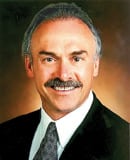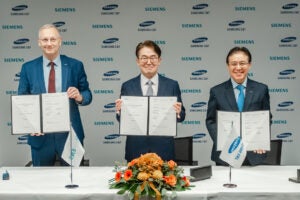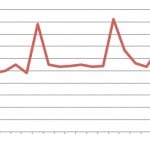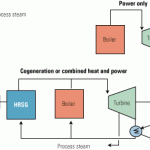ELECTRIC POWER, the world’s most comprehensive conference covering power generation, has been programmed to meet the information needs of power generating companies. Programming is developed under the direction of an industry-based advisory committee comprising approximately 150 members from industry, government, and academia. More than one-third of the members are from gencos.
The program features in-depth topics that cover business, engineering, and plant operations issues. More than 400 speakers and panelists will participate in the program that features 14 conference tracks, two user group meetings, and 12 preconference best practices workshops and tutorials (see box). The North American Electric Reliability Corporation will also colocate its Reliability Standards Workshop at ELECTRIC POWER 2007 on April 30. The latest power industry technologies will be highlighted by approximately 500 exhibitors.
Keynote session
The conference starts with a state-of-the-industry presentation by Dr. Robert Peltier, PE, editor-in-chief of POWER and COAL POWER magazines. He will review issues faced by those in the trenches of the industry and examine topics such as staffing and training concerns, plant ownership changes, the impact of environmental regulations, and how new technology will affect plants.
Following Dr. Peltier’s presentation, Steven Greenwald, a partner with David Wright Tremaine LLP, will lead the CEO Roundtable discussion where distinguished industry leaders will candidly explore both the opportunities and challenges facing the power industry. The conference then moves into breakout sessions, where delegates may choose among the 14 ELECTRIC POWER tracks or the two user group meetings.
Strategic tracks
The following four tracks examine topics from a management perspective.
Power industry trends: Near term. Today’s power industry faces many challenges as it reacts to a changing business environment and ever-increasing demand. The following sessions will present interactive panels of experts who will discuss the key issues of increasing costs of capital projects, retaining and attracting a skilled labor force, the power delivery system, and the business risk faced by the industry:
- Business issues: Capital costs and contracting strategies
- Workforce supply issues
- Energy issues with independent system operators (ISOs) and interconnected operations
- Dealing with business risk in power generation
Fuel strategies: Price/quality/delivery/opportunity. Fuel represents over 70% of the costs for fossil fuel-fired electricity generation, and that resource is currently subject to extreme supply and price volatility. The sessions in this track examine the solutions to coal supply, quality, transportation, storage, and handling challenges; how the impact of coal combustion and gasification residues becomes significant if these are not salable by-products; and the impact of delivery and utilization of liquefied natural gas (LNG) and other gaseous fuels.
Generating fleet optimization and plant optimization. This track will focus on ways to optimize the value of a generating fleet or a single unit. Discussion will focus on tools available and the circumstances, drivers, and challenges of optimization. Topics include commercial availability, system versus ISO operation, knowledge management, strategic sourcing, and software processes and tools for financial optimization.
Power plant safety and security. Effective plant safety and security practices are preached by most companies, but every year accidents happen that cause loss to property and affect the lives of many. This track reviews the benefits of implementing a sound, cost-effective program with sessions on:
- Pandemic contingency planning
- OSHA emphasis on the power industry: Hot topics
- Supervisor/management liability and criminal prosecution
- PRB coal safety: Addressing PRB coal-related hazards
- Dangerous states: Dealing with day-to-day safety issues
- Electric safety for power plant maintenance workers
Tactical meetings: Fuel types
These five tracks examine the latest developments in the power industry by fuel and technology type.
Coal power plants: Upgrades and new capacity. More than 50% of North America’s electricity is generated at coal-fired power plants, and the level of coal consumption is expected to increase for the foreseeable future. The industry is experiencing a boom in new construction, while the existing infrastructure is undergoing a massive environmental retrofit program. Sessions in this track will explore the challenges of—and propose solutions for—new coal projects, advanced pulverized coal technologies, boiler cleaning, repowering/retrofitting, and coal-handing issues.
IGCC, advanced combustion, and CO2-capture technologies. This topic is new in 2007. Coal gasification technologies have been used to produce gaseous fuel from coal for more than a century. Integrated gasification combined-cycle (IGCC) technologies, by which a modern gasification plant fuels a combined-cycle power plant, promise to revolutionize the power industry. Some generating companies have embraced the concept; others are skeptical. These sessions will examine the benefits of and concerns raised by the technology:
- New IGCC projects
- IGCC operating experience and lessons learned
- Gasification technologies
- Carbon capture in gasification plants
- Advances in oxy-fuel combustion
- CO2 capture and sequestration from advanced combustion plants
Gas turbine and combined-cycle power plants. For more than a decade, gas turbine-based power plants—in simple- or combined-cycle configurations—ruled the new plant construction market. High-efficiency projects using a low-polluting fuel created a win-win situation. However, the astronomical increase in the cost of natural gas presented plant operators with unexpected challenges. Sessions in this track examine the issues:
- Combined-cycle operating experience Power augmentation
- Turbine system upgrades
- Impact of plant cycling and fast start-up and shutdown
- Combined-cycle performance optimization and evaluation
- Combined-cycle projects: From challenge to success
Nuclear power. The nuclear renaissance is taking shape, but how is the nuclear industry supporting this renewed growth area of generation? What are the issues that confront current operating plant owners, and how are nuclear plant activities being managed at the same time? Sessions will address these questions plus issues of new reactor design, the nuclear supply chain, and advanced reactor technologies and applications.
Renewable power. Renewable energy has become a mainstay of the power industry and is the fastest growing sector of the industry. Sessions in this track will include an overview of the renewable market and examine the benefits and potential of each renewable option—solar, wind, offshore wind, and biomass.
Tactical meetings: Engineering and operating considerations
These two tracks cover sections of the plant that are not fuel-specific.
Plant operations and maintenance. These sessions examine all aspects of power plant operations and maintenance and offer solutions that promote increased productivity. Presentations include case histories that provide insight into what you should and shouldn’t do:
- Generators: Maintaining the money machine
- Putting your expensive toys to work
- From bunker to stack: Prevention/management of slag and furnace fouling
- Arcs and sparks
- Protecting the future of the industry
- Managing your assets remotely
Power plant components: Design and operation. These sessions focus on the power plant’s capital equipment and examine the benefits of implementing the latest technologies:
- New technology for your tired turbine
- Go with the flow
- Taking the heat
- Lessons learned
- Condensers: Keep your cool and lower your back pressure
- Relieving the pressure of heat exchanger upkeep
Environmental tracks
The following two conference tracks are devoted to environmental topics.
Environmental regulatory issues, strategies, and technologies I and II. Operating companies continue to be challenged by the need to comply with more stringent environmental standards and the need to preserve the value of their generating fleets. These sessions will provide an overview of existing and proposed environmental regulations and examine compliance options. Presentations on the following topics will feature the operating experience at existing installations as well as new and near-commercial technologies:
- Fleetwide considerations for achieving air emission compliance
- State-of-the-art NOx-reduction operating experience
- Controlling selective catalytic reduction systems
- Particulate and SO3 control
- SO2 control: Flue gas desulfurization (FGD) operation, maintenance, overhaul, and upgrades
- SO2 control: FGD technology—wet and dry
- Mercury control: Reduction concepts and solutions I, II, and III
- CO2 and combined emission control technologies
- Water and wastewater issues, including Clean Water Act section 316(b)
Trends and technologies for future power generation
This track explores the future of power generation.
Advanced energy strategies and technologies. Many changes are taking place in the power industry, and ongoing change is inevitable. Where will it lead us? What will our industry look like 25 years from now? Sessions on the modern grid, convergence/adaptation, and FutureGen and its siblings provide a look into our future.
User group meetings
The ELECTRIC POWER Conference is the venue for annual meetings of two influential power industry groups: the Combined Cycle Users’ Group and the PRB Coal Users’ Group. Delegates need to register for the ELECTRIC POWER Conference and upgrade for a nominal additional fee to attend the user group sessions. This upgrade applies to both individual registrants and those participating in discounted group plans.
Combined Cycle Users’ Group Annual Meeting. The Combined Cycle Users’ Group Annual Meeting addresses issues concerning the interactions among all major components of a plant—the gas turbine, heat-recovery steam generator, and steam turbine. These issues are critical at a time when many plants must operate on razor-thin margins and in modes for which they were not designed. Topics covered during the meeting will include:
- Outage planning and management
- Predictive maintenance methods and practices
- What to do when your long-term service agreement expires
- Steam cycle chemistry
- Safety practices
- Steam turbine water induction issues
- Performance and reliability benchmarking
- Natural gas variability effects on combustion turbines
PRB Coal Users’ Group Annual Meeting. The PRB Coal Users’ Group was formed in 2000 to meet the needs of generating companies using, or considering the use of, Powder River Basin coal. Its objective is to encourage the safe, economical use of the resource. The group maintains a database of plants using PRB coal, and the board has developed a list of recommended best practices.
The highlight of the year for members is the annual meeting, which has a reputation for candid, constructive dialog and typically attracts more than 300 delegates. Topics to be covered include:
- Transportation and mining industry update
- Plant of the Year overview
- Pay me now or pay me double later: The cost of mistakes
- Silo washdown system at Monroe Power Plant
- What we would do differently
- A global approach to soot-cleaning optimization
- Coal pile management
- Leading-edge conveyor technologies
- Coal blending: Garbage in/garbage out
- PRB coal silo design: Flowability, dust control, and fire protection
- PRB coal in spreader stoker boilers
- Continuous flyash removal
- Enhanced mercury capture
- Achieving less than 0.10 lb/mmBtu NOx emission levels
- Continuous use of the SHOCKSystem
- History of boiler cleaning
- Nanticoke silo cone fire suppression system
- Coal yard fire system upgrade project
- Target Zero safety program
- Responding to and addressing PRB-related hazards
- Texas A&M fire training
On Wednesday, the meeting’s second day, the group offers three breakout sessions to better serve members’ specific interests in coal handling, boiler/combustion and safety, and fire and risk management.
Final details
Thursday, the last day of the meeting, is restricted to genco members and consists of an open discussion on issues including labor shortages, back shop issues, and planning/execution of outages.
Full conference program details, including topics, speakers/panelists, abstracts, and biographies are available at www.electricpowerexpo.com. Discounted group registration plans are available to companies sending multiple delegates to the conference.











